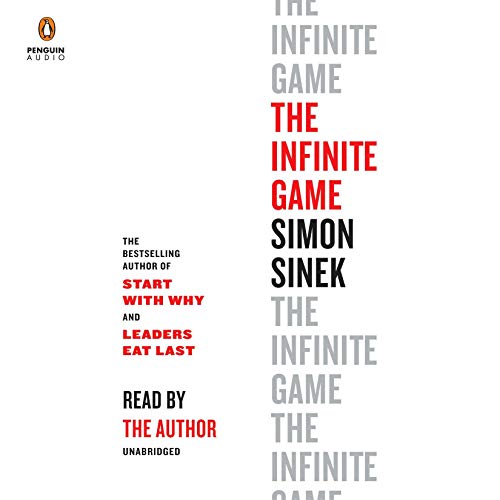
Simon Sinek – The Infinite Game
In “The Infinite Game”, Simon Sinek introduces the concept of the “infinite game” – a fundamental shift in how we approach competition, success, and the purpose of business.
Sinek contrasts the “finite game” with the “infinite game”. Finite games have clear rules, agreed-upon players, and a defined end point where a winner is declared. Examples of finite games include sports, board games, or business competitions. In contrast, the “infinite game” has no finish line – it is an ongoing, ever-evolving challenge without a clear winner.
Finite vs. Infinite Mindset
Sinek argues that many organizations and leaders approach business with a “finite mindset” – focused on short-term goals, beating the competition, and securing their position as the winner. In contrast, the “infinite mindset” looks at the long-term sustainability and resilience of the organization.
The key differences between the finite and infinite mindsets:
- Purpose: Finite – to win. Infinite – to keep the game going.
- Capability: Finite – to triumph over an opponent. Infinite – to build trust and cooperation.
- Measurement: Finite – the financial bottom line. Infinite – the longevity and growth of the organization.
- Rivals: Finite – opponents to be defeated. Infinite – worthy rivals to make you better.
The Just Cause
At the heart of Sinek’s “infinite game” concept is the “Just Cause” – a clear, inspirational vision for the future that guides the organization’s actions. A Just Cause is:
- Inclusive: It calls all people to contribute, regardless of their status or position.
- Service-oriented: It is not self-serving, but aims to advance a cause greater than the organization itself.
- Resilient: It can withstand competition, disruption, and other challenges.
- Idealistic: It represents an infinite, aspirational future that can never be fully achieved.
Sinek argues that organizations guided by a Just Cause are better able to adapt, innovate, and thrive in the face of an ever-changing business landscape.
The Infinite Mindset in Action
Sinek provides examples of companies and leaders that have adopted an infinite mindset, including Marriott, Unilever, and former Mastercard CEO Ajay Banga. These organizations focus on long-term sustainability, building trust with stakeholders, and creating value beyond short-term profits.
In contrast, Sinek criticizes companies and leaders who are trapped in a finite mindset, leading to shortsighted decision-making, eroding trust, and ultimately failing to succeed in the “infinite game” of modern business.
Key Takeaways
- Distinguish between the “finite game” (with clear rules and winners) and the “infinite game” (an ongoing challenge without end).
- Adopt an “infinite mindset” focused on purpose, capability, measurement, and relationship with rivals.
- Develop a “Just Cause” – an inspirational, service-oriented vision to guide the organization.
- Prioritize long-term sustainability and resilience over short-term gains.
- Foster trust, cooperation, and adaptability to thrive in an ever-changing business environment.
(Summary AI assisted)
This book was interesting and I thought Simon had some solid ideas with a lot of real world data to back them up. In this current market drive business world I feel that long term success is often hurt by short term decisions based solely on getting the share price up to keep investors happy (and in turn, the CEO keeps his job)
I like incorporating Simon’s ideas as I develop my leadership style – always keeping an eye on the infinite game helps inform short term strategy decisions by balancing them with long term goals. I can burden my team now with all the demands from the customers and upper management or I can try to manage up as well as down. Setting expectations for work and providing a clear picture of the value of long term thinking.
I found the book thought provoking but a bit idealistic – mostly because while I agree fundamentally with his idea I have some pessimism that we can ever change the short term market thinking.